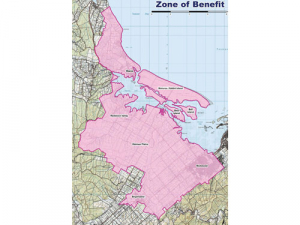Fruit fly discovery puts growers, exporters on edge
Fruit growers and exporters are worried following the discovery of a male Queensland fruit fly in Auckland this week.
 The proposed zone of benefit of the Waimea Community Dam as published in a 2017 Tasman District Council consultation document. SUPPLIED
The proposed zone of benefit of the Waimea Community Dam as published in a 2017 Tasman District Council consultation document. SUPPLIED
Horticulture NZ is welcoming the Tasman District Council’s U-turn on the Waimea Community Dam project.
The $102 million project envisages damming the Waimea River in the Lee Valley, in the ranges east of the Waimea Plains. It aims to use the stored water for agricultural irrigation on the plains, and to protect urban water supplies and river flows in dry periods.
The project is on again after the Tasman District Council voted to reverse an earlier ‘no’ decision on the basis of a revised funding model which mayor Richard Kempthorne said would lower the expected costs for ratepayers.
Richard Palmer, the acting chief executive of Horticulture NZ, says the Tasman district is a prime horticulture area -- the second-largest grower of apples and a big producer of kiwifruit, berries and vegetables.
“The key thing is that... for farming businesses to contribute to the economy and keep hiring people, they need certainty [about] water.”
Palmer acknowledges a personal interest in the scheme: his father John Palmer is the strategic advisor to the project. And he is a director of a packing business in the district, although the family’s orchard is outside the irrigation area.
Palmer says some people seemed to think farmers’ existing water rights should be curtailed to provide for increased river flows and urban water take. He says the dam will address all three fundamental issues: raising minimum flows in line with the national water policy statement, irrigation, and urban water use.
Palmer says it costs several hundred thousand dollars to set up a kiwifruit orchard. He believes people would not make that investment if they thought the vines would die in the second year due to a lack of water.
Horticulture is a key economic driver of the region. “Horticulture is an expensive investment. It delivers very high economic returns on a per hectare basis but that’s only possible with the necessary infrastructure, including certainty of access to water,” Palmer says.
He says people who argued that only “rich farmers would benefit” were forgetting that a minimum flow issue in the Waimea River still had to be addressed.
“If you want to address that, you must have some sort of recharge.”
Palmer says it is not just irrigators who will benefit from the dam.
“A whole lot of industries needing water would lose it in dry periods. It’s not just irrigators, yet it’s irrigators – together with their funders – who are stumping up [most] of the money.”
The dam project was revived when three councillors who had voted against it nine days earlier changed their votes after hearing the revised proposal behind closed doors.
The project also benefits from loan funding from Crown Irrigation Investments Ltd (CIIL).
When the Government said in April that it would end CIIL funding for large irrigation projects, several proposed schemes were put at risk; but Waimea was identified as one of three -- along with stage two of Central Plains and the Kurow Duntroon scheme -- for which existing funding commitments would be met.
The World Wide Sires National All Day Breeds Best Youth Camp Best All Rounder plaudit has become family affair, with 2026 Paramount Cup winner Holly Williams following in her sister Zara's footsteps.
DairyNZ is giving New Zealand farmers a unique opportunity to gain hands-on governance and leadership experience within the dairy sector.
Herd improvement company LIC has posted a 5.2% lift in half-year revenue, thanks to increasing demand for genetics.
According to the latest Fresh Produce Trend Report from United Fresh, 2026 will be a year where fruit and vegetables are shaped by cost pressures, rapid digital adoption, and a renewed focus on wellbeing at home.
The Roar is a highlight of the game hunting calendar in New Zealand, with thousands of hunters set to head for the hills to hunt male stags during March and April.
OPINION: The past few weeks have been tough on farms across the North Island: floods and storms have caused damage and disruption to families and businesses.

OPINION: Meanwhile, red blooded Northland politician Matua Shane Jones has provided one of the most telling quotes of the year…
OPINION: This old mutt has been around for a few years now and it seems these ‘once in 100-year’ weather…